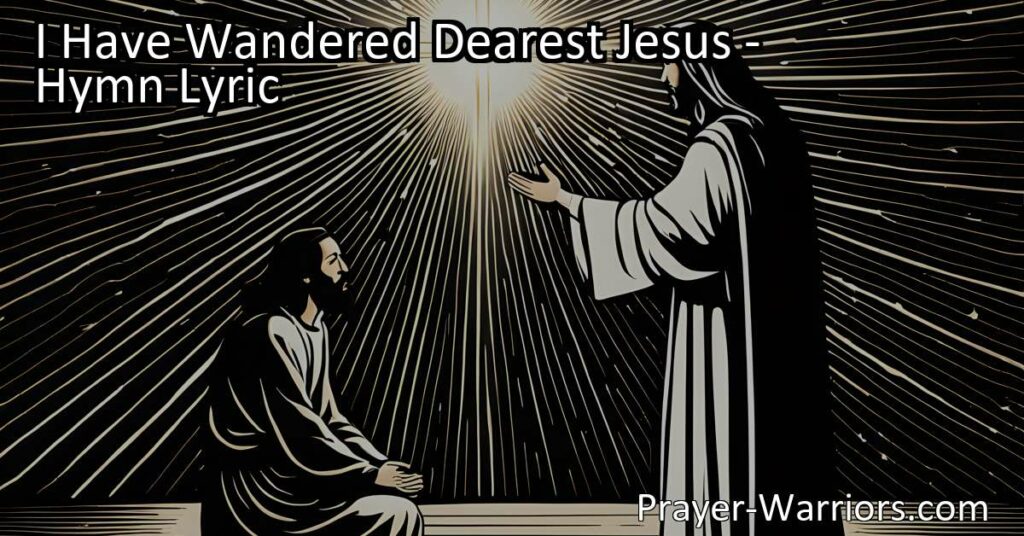I Have Wandered Dearest Jesus – Hymn Lyric
In the hymn “I Have Wandered, Dearest Jesus,” the author expresses their heartfelt remorse for straying away from Jesus and their desire to be guided back to him. People of all ages and backgrounds can relate to the emotions expressed in this hymn, as it touches upon the common experience of feeling distant from God or disconnected from our faith. The hymn emphasizes the importance of repentance, surrender, and seeking forgiveness, reminding us that Jesus is always ready to welcome us back with open arms.
Table of Contents
I Have Wandered Dearest Jesus – Hymn Lyric
I have wandered, dearest Jesus, far from thee;
I have steeled my heart against thee, calling me;
I have heard thy sweet voice pleading, I have turned away unheeding,
But now docile to the leading, I shall be.
I have sinned against thee, Jesus, scorned thy Word;
I have shunned the light thy grace and love afford;
I have mocked thee and defied thee, I have scourged and crucified thee,
Lo, I come, repentant; guide me, gentle Lord.
Nevermore to wander, Jesus, far from thee;
On my path a plenteous light thou shed’st for me;
Nevermore o’er symbols moping, not in man’s vain power hoping,
Nor in darkness feebly groping, I am free.
Meaning of I Have Wandered Dearest Jesus
In the hymn “I Have Wandered, Dearest Jesus,” the author expresses their heartfelt remorse for straying away from Jesus and their desire to be guided back to him. The hymn acknowledges the times when the author turned their back on Jesus, ignored his voice, and rejected his love. However, it also conveys a sense of repentance and surrender, as the author acknowledges their sins and calls out to Jesus for forgiveness and guidance.
This hymn touches upon a universal human experience – the feeling of being distant from God or disconnected from our faith. People of all ages and backgrounds can relate to the emotions expressed in this hymn. We all make mistakes, and at times we may find ourselves feeling lost and separated from our spiritual path. However, just like the author of this hymn, we have the power to seek forgiveness and realign ourselves with Jesus.
The hymn begins by acknowledging the author’s wandering away from Jesus. They confess that they have hardened their heart against Him and turned a blind eye to His loving call. This verse vividly portrays how the author deliberately chose to ignore Jesus’ gentle voice, rejecting His guidance and love. Many of us can resonate with this sentiment, as we often find ourselves succumbing to the distractions and temptations of the world, forgetting to prioritize our relationship with Jesus.
However, the hymn doesn’t dwell solely on the author’s past transgressions. It takes a turn towards repentance and surrender. The author realizes the errors of their ways and expresses a heartfelt desire to be docile to the leading of Jesus. This word choice – “docile” – suggests a willingness to be guided and a humble recognition of one’s need for divine direction. It is an invitation for Jesus to take charge of their life and lead them back onto the right path.
The hymn then delves into a reflection on the magnitude of the author’s sins. They openly admit to scorning Jesus’ Word and shunning His grace and love. The imagery of mocking, defying, scourging, and crucifying Jesus emphasizes the severity of their transgressions. However, the author doesn’t shy away from their past mistakes. Instead, they continue to express their repentance and beg for Jesus to guide them with His gentle presence.
The hymn continues with the declaration that the author will no longer wander away from Jesus. They affirm their commitment to staying in His embrace and walking in His light. The plenteous light mentioned in the verse represents the abundant blessings, wisdom, and guidance that Jesus provides to those who seek Him. It symbolizes a renewed sense of purpose and direction that comes from truly following Jesus and staying close to Him.
The author also acknowledges their rejection of religious symbols and man-made solutions. They understand that true peace and fulfillment can only be found in Jesus, not in the superficial and transient things of this world. This recognition shows a mature understanding of faith and a willingness to let go of worldly attachments.
Finally, the hymn concludes with a powerful statement of freedom. The author proclaims that they are no longer bound by their past mistakes or by the limitations of human power. By surrendering to Jesus, they have experienced true freedom and liberation from the chains of sin and guilt. This freedom comes from the knowledge that Jesus forgives and accepts all who come to Him, no matter how lost or broken they may feel.
In conclusion, “I Have Wandered, Dearest Jesus” is a heartfelt hymn that speaks to the universal human experience of straying away from God and seeking His forgiveness and guidance. Regardless of our age, background, or literacy level, we can all relate to the emotions expressed in this hymn. It reminds us that no matter how far we may have wandered, Jesus is always there to welcome us back with open arms. By surrendering to His leading, we can find true freedom, peace, and fulfillment.
I hope this hymn inspired image brings you hope and peace. Share it with someone who needs it today!



